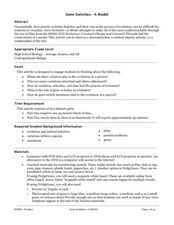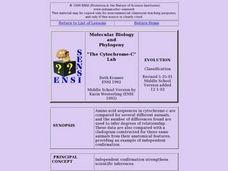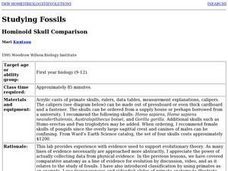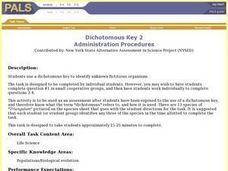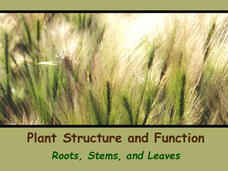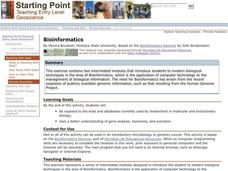Curated OER
Natural Selection.... a Cumulative Process... it's in the cards!
Learners working in pairs attempt to produce a full sequence of 13 cards of one suit (ace - to king). This must be done by shuffling the suit of cards for each round, then checking the cards.
Curated OER
Gene Switches- A Model
Students explore genetic variation within a population. In this genetic adaptation lesson, students investigate the reasons contributing to genetic adaptation. Students collaborate and analyze DNA models. Multiple resources are provided.
Curated OER
The Cytochrome-C Lab
Learners examine a method biologists use to try to determine relationships. They examine how amino acid sequences have been determined for a number of proteins, and how scientists can make inferences about DNA based on the amino acid...
Curated OER
Studying Fossils: Hominoid Skull Comparison
Students collect data on the differences in Hominid skulls using acrylic casts of fossil skulls. They measure a series of structures on skulls from six different species then use the data to determine evolutionary relationships between...
Curated OER
The Hardy-Weinberg Equilibrium
Students act out a drama in this lesson on one aspect of the Hardy-Weinberg Equilibrium. They are to follow all stage directions precisely and give it their best effort to get across the main points of the play.
Curated OER
Dichotomous Key 2
Students use a dichotomous key to identify unknown fictitious organisms in an assessment designed to be used after a discussion on the use of a dichotomous keys has occurred. Follow up questions about key included.
Curated OER
Fishes
In this fish evolution instructional activity, students will use 3 diagrams of the evolution of the jaws of fish to complete 2 short answer questions.
Curated OER
Gaia: The Wisdom of the Earth
Learners are introduced to Gaia theory of natural homeostasis. They graph Earth's temperatures over time, construct terrariums or monitor the outdoor environment. Related videos titles are suggested, but may be outdated. The objectives...
Curated OER
Classification and Binomial Nomenclature
Students practice identifying different groups of living organisms using a dichotomous key. Students also examine the history of an organism and its lineage by writing a paragraph about it and "three generations" of ancestors.
Howard Hughes Medical Institute
Color Variation over Time in Rock Pocket Mouse Populations
A species-specific look at natural selection, the resource herein examines how adaptations have helped the population of rock pocket mice survive in a changing landscape. To begin, middle or high schoolers watch a 10.5 minute video,...
Curated OER
Jurassic Park: The Science and Ethics of Genetic Engineering
Explore genetic engineering through an engaging "Jurassic Park" unit, which is an extensive use of a cross-curricular teaching event. Planned for AP Biology, English, and Calculus students, learners and teachers are involved for 4-6...
Howard Hughes Medical Institute
Stalking the Genetic Basis of a Trait
Need an a-maize-ing lesson to show your class how regulatory genes work? If you use the well-written resource, they'll be all ears! Biology scholars discover the gene responsible for the evolution of the modern-day corn plant through a...
Curated OER
Control of Eukaryotic Genes
Covering the molecular interactions involved with DNA packing and the control of gene activity in depth, this slideshow is useful for higher-level biology students. The biochemical components of protein translation are diagrammed and...
Curated OER
The Cell Cycle: Cell Growth, Cell Division
Help your students understand cell division. Explore the topics of mitosis by examining the details of chromosomes at interphase, metaphase, anaphase, prophase, and telophase. Wonderful slides will keep your students' attention while...
Howard Hughes Medical Institute
Winogradsky Columns: Microbial Ecology in the Classroom
Winogradsky columns are ideal for observing the role of bacteria and other microorganisms in an ecosystem. This student activity guide is complete with data tables for observations and analysis questions for processing what was observed....
ARKive
Darwin and Natural Selection
A presentation on Darwin's theory of evolution and natural selection could be a good addition to your biology class. It provides general information about how animals adapt to their surroundings, as well as how organisms create more...
Biology Junction
Plant Structure and Function: Roots, Stems, and Leaves
Scientists found fossils of plants more than 420 million years old—but plants existed for up to 100 million years prior to these fossils. Learn about the importance of plants to the entire planet. Viewing a presentation helps scholars...
Curated OER
A Discourse on the History of Language
Analyze and make inferences from the information used by linguists to construct the evolution of languages. They research different dating techniques to explain how scientists infer age with evidence.
Curated OER
Photosynthesis: Life from Light and Air
All aspects of the photosynthesis process, and the way that plants have adapted with specializations are detailed here. The diagrams and info-graphics will be useful to your AP biology class. It could also be used as a review covering...
Curated OER
Community Ecology
Chart ecological community interactions and answer questions about niche, defenses, trophic structure, and succession. This community ecology worksheet provides a general overview of the interactions that occur among organisms that share...
Curated OER
Bioinformatics
Students are exposed to the tools and databases currently used by researchers in molecular and evolutionary biology. They gain a better understanding of gene analysis, taxonomy, and evolution.
Curated OER
Word Adaptation
Seventh graders differentiate evolution and adaptation. In this biology lesson, 7th graders make new words from a given word by adding or changing a letter. They set up a T-chart and enumerate how adaptation is like or unlike evolution.
Curated OER
Blocks And Screws (or "screwy Contrivances")
Young scholars, given a block of wood and a screw or nail, are asked to put that screw or nail into a block. They examine how many contrivances and other imperfections found in living things are best explained by the process of evolution.
Curated OER
The Right Tool for the Job: Fishing Tools and Technology
Students use modern technology to research the history, design, and function of a specific tool or piece of fishing technology. They create a timeline and story about the evolution of the tool.



